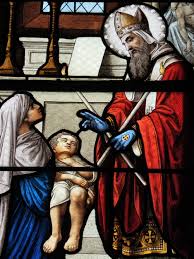February 3 St. Blaise

One reason for St. Blaise's popularity arose from the fact he was a physician who cured, even performing miraculous cures. Thereby, those who were sick, especially with throat ailments, invoked his intercession. Eventually the custom of the blessing of throats arose, whereby the priest held two crossed candles over the heads of the faithful or touched their throats with them while he invoked the prayer of the saint and imparted God's blessing. In our present Roman Ritual, the priest prays, "Through the intercession of St. Blaise, bishop and martyr, may God deliver you from every disease of the throat and from every other illness, in the name of the Father, and of the Son, and of the Holy Spirit." This practice continues in many parishes on St. Blaise's feast day.
Story of St. Blaise By Father William Saunders from [Arlington Catholic Herald Web Site: http://www.catholicherald.com/] In accord with various traditions, St. Blaise was born to rich and noble parents, and received a Christian education. He was a physician before being consecrated a bishop at a young age. Although such a statement seems terse, keep in mind that at that time the local community usually nominated a man to be a bishop based on his outstanding holiness and leadership qualities; he in turn was then examined and consecrated by other bishops with the approval of the Holy Father. Therefore, St. Blaise must have been a great witness of our Faith, to say the least. During the persecution of Licinius in 300, St. Blaise, receiving some divine command, moved from the town, and lived as a hermit in a cave. Wild animals visited, and he healed any that were sick and wounded. One day, a group of hunters gathering wild beasts for the game in the amphitheater discovered St. Blaise and seized him. As he was being taken to the governor Agricolaus, the governor of Cappadocia and Lesser Armenia, St. Blaise encountered a woman whose pig was being seized by a wolf; St. Blaise commanded the wolf to release the pig, and it was freed unhurt. While in prison, he miraculously cured a small boy who was choking to death on a fishbone lodged in his throat. Also, the woman whose pig had been saved brought St. Blaise candles so that his cell would have light and he could read the sacred Scriptures. Eventually, Agricolaus condemned St. Blaise for upholding his Christian faith rather than apostatizing. He was tortured with the iron comb (an instrument designed for combing wool but was used here for shredding the skin) and finally beheaded. By the sixth century, St. Blaise's intercession was invoked for diseases of the throat in the East. As early as the eighth century, records attest to the veneration of St. Blaise in Europe, and he became one of the most popular saints in the spiritual life of the Middle Ages. Many altars were dedicated to his honor, and even the Abbey of St. Blaise in southern Germany claimed to have some of his relics. |
To Do:
Go to Mass today and have your family’s throats blessed. To Pray: Prayer to St. Blaise or Blase for protection, particularly from afflictions of throat. O glorious St. Blaise, who by your martyrdom left to the Church a precious witness to the Faith, obtain for us the grace to preserve within ourselves this divine gift, and to defend — without concern for human respect — both by word and example, the truth of that same Faith, which is so wickedly attacked and slandered in these our times. You miraculously restored a little child who was at the point of death because of an affliction of the throat. Grant us your mighty protection in similar misfortunes. And, above all, obtain for us the grace of Christian mortification, together with faithful observance of the precepts of the Church, which keep us from offending almighty God. Amen. |


